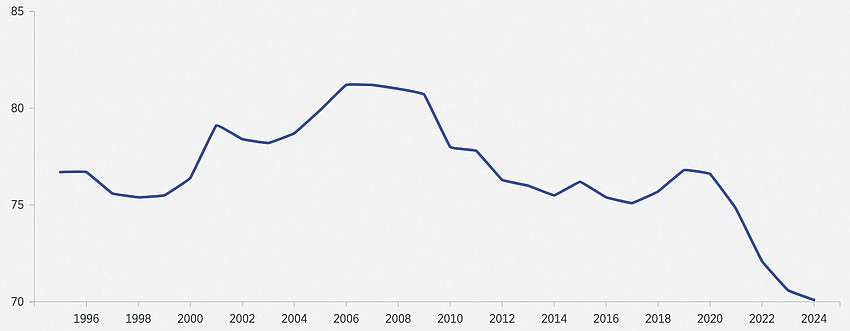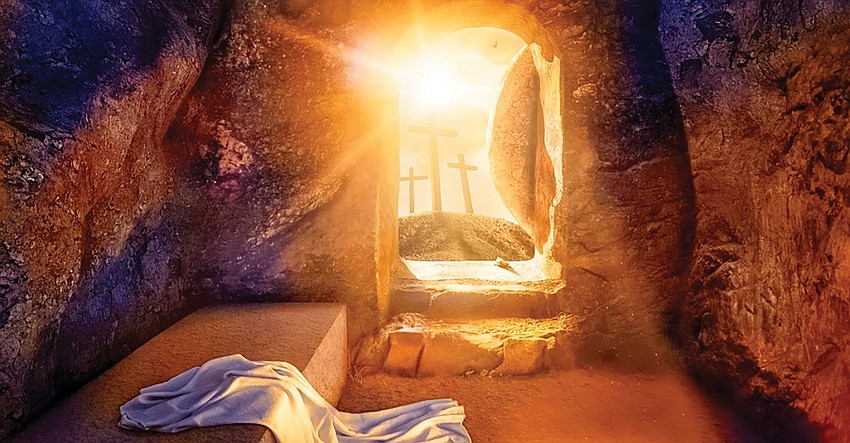- April 4, 2025
-
-
Loading
For Christians throughout the world, come this Easter Sunday, we will celebrate Jesus Christ’s glorious resurrection and the opportunity he gave us to achieve our own salvation from eternal damnation.
Rejoice and be glad.
At least try, because a form of that damnation is about to begin. We are about to enter our own Passion for 2024 — the full-on, political election cycle, our Stations of the Cross, the incessant media and mail onslaught of the lead-up to the Nov. 5 national elections.
That onslaught already has been underway through the presidential primary season. It’s going to get worse. We will be barraged with even more text messages from political parties and candidates seeking money and your vote.
Now, it’s easy to ignore the texting; type “stop.” Indeed, out of frustration and disgust with what has occurred nationally over the past eight years, it’s tempting just to block out all of the campaigning and go on with your life.
But don’t. During these election cycles, we often think of the famous quote from the famous Greek philosopher, Plato: “If you do not take an interest in the affairs of your government, then you are doomed to live under the rule of fools.”
To a great extent on the national level, we have been living under the rule of fools for a long time, especially the past four years.
Look at any national marker — war, immigration, crime, public policy, social mores and, especially, your economic well being. Every one of these markers has declined precipitously nationally under the current administration.
To that end, one of the economic markers that always catches our attention is the Heritage Foundation’s annual Index of Economic Freedom. For 30 years, Heritage has been scoring and measuring 170-plus nations in 12 areas of government policy that affect individuals’ freedom and economic well being.
Early on in its scoring, the United States typically ranked among the top-performing nations. But as you can see in the graph, the U.S. has fallen to its lowest level in 30 years — all because of fiscal failure in Washington.

In this year’s rankings on government spending, the U.S.’ score was 48.7; on fiscal health, 0.0. Anything below 50 in Heritage’s index is considered “repressive,” which, by the way, puts us in the company of China, Iran and North Korea.
Thankfully, for us in Florida, conditions are entirely different. Florida over the past decade is the top economic performing state, according to the Rich States, Poor States: ALEC-Laffer State Economic Competitiveness Index, compiled and published by the American Legislative Exchange Council.
In terms of economic outlook, based on recent legislative actions, the ALEC-Laffer index drops Florida to ninth, but still among the top-performing states. For 11 of the 16 years of the ALEC-Laffer Competitive Index, Florida has ranked among the top 10. Its lowest ranking came in 2008 (the start of the Great Recession), when it fell to 16th.
The overall message that comes from these two indexes is what economist Arthur Laffer, one of the authors of the states’ competitive index, has learned in the 16 years of tracking states’ economic performance: States that spend less and tax less always outperform states that spend and tax more.
Likewise, as the authors of the Heritage Foundation’s Index of Economic Freedom note: “The standard of living measured by per capita incomes, is much higher in economically freer countries. Countries rated ‘free’ or ‘mostly free’ in the Index generate incomes that are more than double the average levels in other countries and more than six times higher than the incomes of people living in … ‘repressed’ countries.”
So let’s be clear here: The underlying (and overriding) point of citing the two indexes above is this: The key to everyone’s well being hinges on individual liberty and capitalism, not on Statism and collectivism.
In the spring edition of the Objectivist Standard, Andrew Bernstein, a former philosophy professor at Marist College and author of “Capitalism Unbound: The Incontestable Moral Case for Individual Rights,” authored a must-read essay entitled, “Capitalism in One Lesson.” Among the overwhelming evidence of the virtues of capitalism that he presents, he writes:
“Statist systems are those in which the state largely controls the individual’s life. Under statism, the government might decide one’s career, require that individuals gain permission to live in a given area, prohibit travel without government approval, restrict criticism of government policy, control the exercise of religion and more.”
Sound familiar?
“Under full-blown Statism,” he continues, “the state controls nearly every aspect of an individual’s life, so one lives by permission … “The state comes before the individual. The government does not serve the people; the people serve the government.
“Under capitalism, an individual lives freely, not by permission but by right. As long as he does not initiate force or fraud against others, an individual is free to live as he chooses. The government exists to protect the rights of individuals.”
As the election campaign season gains momentum, and as you read, hear and see the candidates seeking your vote, stay attuned to what they say. In the case of those seeking re-election, stay attuned to how they have voted.
Do their fundamental beliefs side with bigger government; more government intervention into our lives and businesses; more government programs; more regulation? All of that leads to less freedom, less economic growth, less wealth, more socialistic collectivism.
And listen closely to their speeches and slogans. If you have the opportunity, ask them: What is more moral and practical — capitalism or altruism?
Overwhelming historical evidence favors the former.
Which Christian feast is greater — Christ’s birth or resurrection?
In the secular, material world, clearly, it’s the former — Christmas.
But in Christianity, you can say they are equal. To be sure, Christ’s resurrection would not have occurred without his birth.
So, you could say Christ’s birth was the first of God’s two-step plan for man’s salvation from our first parent’s sin.
Theologically, St. Thomas Aquinas, regarded as the Catholic Church’s foremost theologian, ascribed five reasons for Easter (Christ’s resurrection from the dead). Here they are, translated by the St. Paul Center for Biblical Theology in Ohio.
The five reasons are straightforward. But to understand Aquinas’ explanations, you probably should read them at least twice.
Happy Easter. He is risen.

1. It reveals God’s justice.
Because Christ humbled himself as a man and died on the cross out of love and obedience to God the Father, God lifted up Christ by a glorious resurrection.
2. It was necessary for the confirmation of our faith in Christ.
Aquinas cites St. Paul, who explains that the resurrection attests to the power of God (2 Corinthians 13:4). “For he was crucified in weakness, but lives by the power of God. For we also are weak in him, but in dealing with you we will live with him by the power of God.”
3. It gives us hope for the resurrection of our bodies.
This, of course, is the whole point of 1 Corinthians 15. As Paul writes, “Now if Christ be preached that He rose from the dead, how do some among you say, that there is no resurrection of the dead?”
4. It means death to sin and new life in Christ for us.
Since we are united with Christ, we have not only died with him, but been raised with him to newness of life. Aquinas cites Romans 6:4, 11: “We were buried therefore with him by baptism into death, so that as Christ was raised from the dead by the glory of the Father, we too might walk in newness of life … So you also must consider yourselves dead to sin and alive to God in Christ Jesus.”
5. It completes the work of salvation.
Christ’s death is not the only aspect of his work for our salvation. Again, Aquinas cites Paul, who explains that Christ was “put to death for our trespasses and raised for our justification” (Romans 4:25). Most people forget about this verse and simply profess that Jesus died for our salvation — but that’s only part of it.
As Aquinas explained, salvation involves two elements: 1) the payment of the debt due to sin, which is accomplished on the cross (he was “put to death for our trespasses”); and 2) he is raised for our sakes as well (e.g., “for our justification”)
Ultimately, Jesus’ resurrection wasn’t for his sake but for ours. The goal of salvation was not simply to save us from sin, but to unite our humanity to God.
Christ’s resurrection, then, is the cause of our sharing in the new life of grace — the unity of our humanity with divinity.
Salvation isn’t just a matter of being delivered from the punishment due to sin, namely, hell; it also means being delivered to life in God.